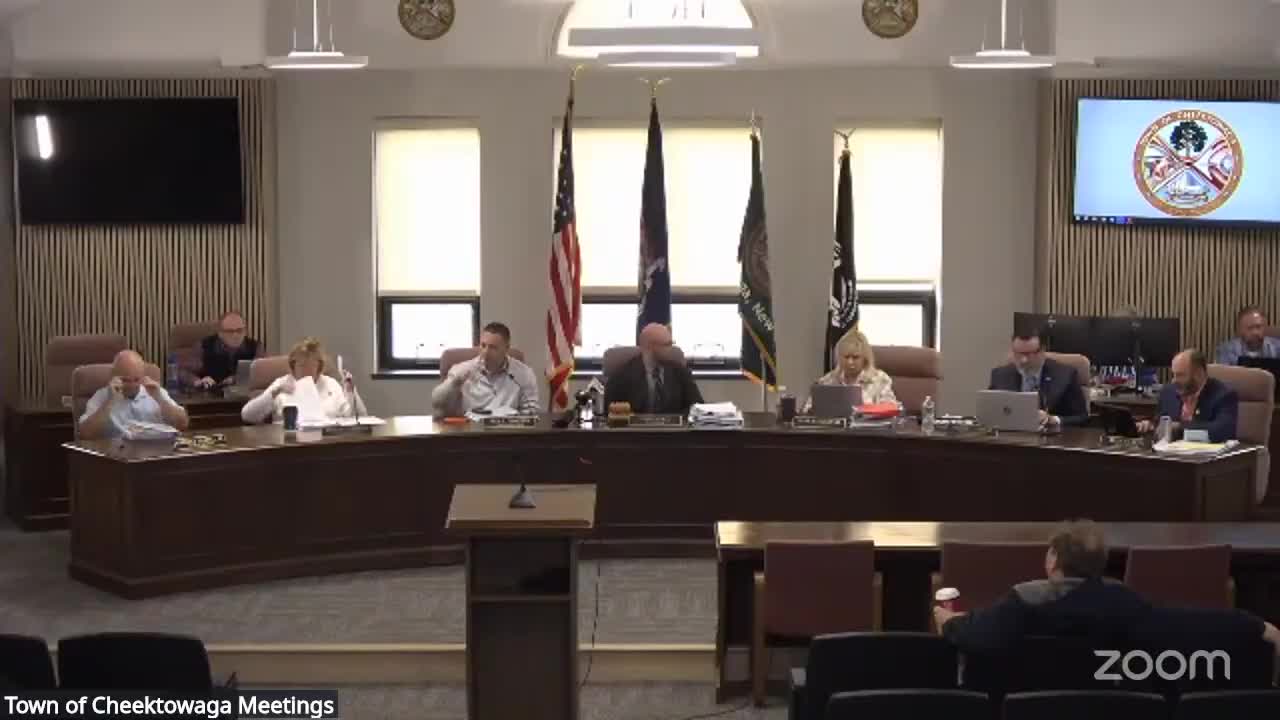Cheektowaga board seeks roughly $3.7M in cuts as 2026 levy projections exceed state tax cap
Get AI-powered insights, summaries, and transcripts
Subscribe
Summary
At a special Town Board meeting, finance staff and board members reviewed the 2026 preliminary budget and sketched more than $3 million in potential savings while debating revenue adjustments and whether to rely on fund balance or borrow for capital equipment.
Comptroller Dennis Dombrowski and town finance staff presented the town’s preliminary 2026 budget at a special Town Board meeting focused exclusively on the spending plan and revenue forecasts. Board members discussed a mix of revenue increases and spending cuts after staff said the projected levy increase would substantially exceed the state tax cap unless the board reduces spending or uses fund balance.
The board heard countywide trend analysis from Dombrowski showing rising fixed costs (pensions, health insurance and debt service) and shrinking unassigned fund balances. Finance staff member Brian Krause told the board the formal state tax-cap calculation for Cheektowaga equates to a 2.58% allowable levy increase — about $1,898,206 — while the current 2026 levy projection on the table was roughly $5.59 million, meaning the board would need to close roughly $3.7 million in additional spending or identify other offsets to remain under the cap.
Why it matters: staying within the state tax-cap formula avoids a larger, automatic levy increase and is a central constraint on the board’s choices. With fund balances already drawn down in recent years and several large recurring costs rising, the board said it would have to choose between using reserves, trimming programs and personnel, or borrowing for capital equipment — each with trade-offs for services and long‑term finances.
Discussion highlights - Revenues: Krause walked through several revenue lines the board could reforecast. He reported a projected 2025 sales-tax total of about $12.65 million (a 3.3% increase over 2024) and presented mortgage‑tax history that made some board members comfortable raising the 2026 mortgage‑tax forecast above the draft number. Board members also proposed raising the nascent local cannabis revenue projection (staff’s interim figure was $215,000) to $250,000 and budgeting $500,000 conservatively for a proposed hotel bed tax rather than an aggressive estimate.
- Mandatory and discretionary spending: Board members and staff identified recurring, high‑cost lines that could be reduced or paused. Suggestions included: putting the proposed assistant director of information technology position on hold; reducing special events and cultural funding (Polish Fest, some symphony contributions and employee recognition); delaying or bonding vehicle and heavy‑equipment purchases rather than paying from operating cash; and reconsidering three seasonal pools (one suggested closure, two debated) and related youth‑rec programming. Dombrowski cautioned that vehicle/equipment bonding reduces short‑term pressure on 2026 but increases long‑term debt service.
- Human services and seniors: The board debated a $57,250 annual contribution to Meals on Wheels (FeedMore) and whether the town should cut it to reduce the levy. Councilman Pularski noted the town funds Meals on Wheels while some recipients pay income‑based fees and estimated the town’s contribution equated to roughly $0.89 per delivered meal for the roughly 242 Cheektowaga recipients cited by staff. Several members urged the town to ask the provider to present program usage and financials at the board’s next meeting before making a final decision.
- Public safety and staffing: The police budget included an upgrade request (police officer to sergeant). Staff and the chief discussed that removing the upgrade would reduce the added cost to about $20,000 rather than the full salary difference shown in the draft. The board also discussed overtime control across departments and whether more in‑house work could substitute for contracted services.
- Legal and labor risk: Human resources and personnel legal expenses have been rising; staff said 2025 legal spending will likely exceed the current appropriation and recommended raising the personnel/legal line by roughly $100,000 to cover anticipated grievances and arbitration work.
Decisions and next steps - The board did not take any final votes on the budget at the meeting. Members agreed to prepare a set of line‑item changes and to ask staff to draft a resolution reflecting those changes so the town can publish a preliminary budget and call the public hearing scheduled for the next board meeting. - The board asked staff to invite Meals on Wheels (FeedMore) to the next meeting to explain service numbers and funding uses before the board decides whether to trim that contribution. - Staff was asked to provide updated, line‑by‑line cost and revenue worksheets (including adjusted mortgage‑tax, sales‑tax and cannabis revenue scenarios and the equipment/vehicle list for possible bonding) so the board could finalize a proposed preliminary budget and resolution before the public hearing.
What remains unresolved The board still needs to identify about $3.7 million in spending reductions or offsets to reach the tax‑cap target that Krause computed. Members debated whether to rely on one‑time uses of fund balance, ongoing program cuts (pools, cultural grants, staffing), or borrowing for capital equipment — each option carries fiscal and service consequences.
The board scheduled further review and asked staff to circulate the revised line‑by‑line figures in advance of the next meeting and the public hearing so residents have the board proposal before the hearing.
